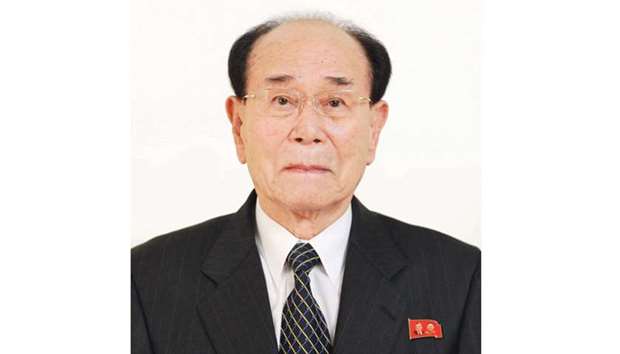North Korea’s official KCNA news agency confirmed that Kim Yong-nam, president of the Presidium of the Supreme People’s Assembly, would attend the Olympics’ opening ceremony on Friday in South Korea’s alpine resort town of Pyeongchang.
Seoul’s Unification Ministry said Kim would lead a 22-strong delegation that was expected to arrive in South Korea on Friday for a three-day trip. Kim’s visit comes as Seoul pins its hopes on high-level talks during the Feb 9-25 Games between not only the two Koreas but also the North and the United States.
The South’s presidential Blue House in Seoul said the visit by Kim, the most senior North Korean official to cross the border into the South since the Korean War ended with a truce in 1953, would create “various opportunities” for high-level talks.
“(Kim’s visit) shows North Korea’s resolve for improved inter-Korean relations and the success of the Olympics, as well as its sincere, earnest attitude,” Blue House spokesman Kim Eui-kyeom told a news briefing. The Games opening ceremony will also be attended by US Vice President Mike Pence, Japanese Prime Minister Shinzo Abe and other world leaders.
South Korean President Moon Jae-in told his US counterpart Donald Trump in a phone call that the momentum of improved North-South relations would continue and that Pence’s visit would be an “important prelude for that”, according to the Blue House.
Trump said during a meeting with North Korean defectors that, despite a “very tricky situation”, North Korea’s participation in the Olympics could result in “something good”.
However, a White House official has said Pence planned to use his attendance to counter what he sees as Pyongyang’s efforts to “hijack” the Olympics with a propaganda campaign. A North Korean art troupe would also likely travel by ship to perform during the Olympics under an exemption from bilateral sanctions, the South’s Unification Ministry said yesterday.
With performances set for later this week, the North proposed that the art troupe use a ferry for transportation and lodging, according to the Unification Ministry.
South Korea banned all North Korean ships from entering its ports in May 2010 and cut off most inter-Korean exchanges, including tourism, trade and aid, in response to a torpedo attack by the North on a navy ship that killed 46 sailors.
The Unification Ministry said no final decision had been made but it was in consultation with Washington and others to temporarily lift the ban to facilitate the North’s proposal. “We’re seeking to apply an exemption for the May (2010) measures to support a successful hosting of the Olympics,” ministry spokesman Baik Tae-hyun told a news briefing.
The North used the ship, the Mangyongbong 92, for similar purposes during the 2002 Asian Games in the South Korean port city of Busan. The ship now chiefly operates between North Korea and Russia.
The North had initially asked that the art troupe be allowed to cross the border by foot via Panmunjom, located in the demilitarised zone where a North Korean soldier staged a daring defection to the South in November.
The orchestra is scheduled to perform at Gangneung, near Pyeongchang, on Thursday and in the capital, Seoul, on Sunday.
A lawmaker in Seoul said some 36,000 foreigners had been banned from entering South Korea, including people connected with extremist groups such as Islamic State, to ensure security during the Games.
Lawmaker Yi Wan-young told reporters of the ban after being briefed by the nation’s spy agency yesterday. Yi said around 60,000 security personnel would guard Olympics venues.
Kim is North Korea’s nominal head of state, while the reclusive country is ruled by Kim Jong-un, the third-generation hereditary leader.
Kim Yong-nam also attended the 2008 Summer Olympics in Beijing and the 2014 Winter Olympics in Sochi, Russia. He is not blacklisted by the United Nations or the United States because he is not involved in the North’s illicit nuclear and missile programmes or associated with related research institutes.
In 2014, Pyongyang sent Choe Ryong-hae, a close aide to Kim Jong-un, as part of a high-level delegation to attend the closing ceremony of the Asian Games in Incheon, South Korea.
Choe is subject to unilateral sanctions imposed by South Korea in 2016. “Kim Yong-nam has little influence in North Korean internal politics, inter-Korean affairs or the nuclear issues, but has mainly been taking charge of summit diplomacy,” said Cheong Seong-chang, a senior fellow at South Korea’s Sejong Institute think tank.
“This time, if he gets to meet Moon, he could convey Kim Jong-un’s message or invitation to Pyongyang,” Cheong said.

